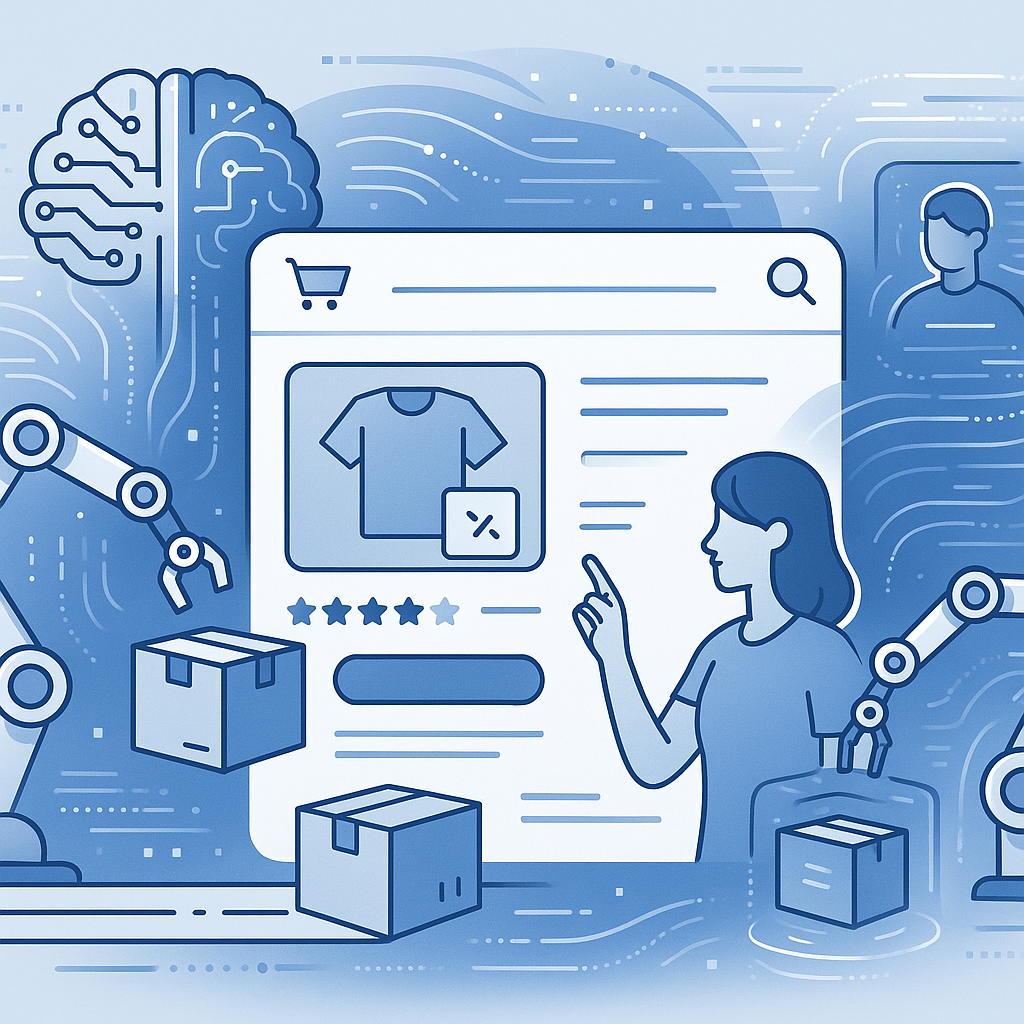
Revolutionizing E-Commerce: AI Fuels Innovation & Customer Experience
Introduction
The evolution of online e-commerce in 2025 is inseparable from the transformative influence of artificial intelligence (AI). Once a futuristic concept, AI now powers innovative solutions enhancing every facet of the online shopping experience. This integration not only drives operational efficiencies but revolutionizes how customers interact with digital marketplaces.
AI-Powered Personalization: Crafting Unique Shopping Journeys
One of the most visible impacts of AI on the online e-commerce business is personalization. Advanced AI algorithms analyze vast amounts of customer data — including browsing habits, purchase history, and real-time interactions — to curate tailored product recommendations and dynamic content.
For example, AI-driven recommendation engines have evolved beyond simple product suggestions to creating personalized landing pages. These pages adjust their layout, promotions, and product offerings based on inferred customer preferences, making each shopping journey unique. Retailers utilize natural language processing to craft personalized marketing messages that resonate on an individual level, improving engagement and conversion rates.
Case Study: Virtual Try-Ons and AI-Enhanced Visual Search
Companies specializing in fashion and beauty employ AI to offer virtual try-on experiences through augmented reality (AR), allowing customers to see how products look in real-time before purchase. Meanwhile, AI-powered visual search enables shoppers to upload images and find similar or complementary products instantly. These innovations dramatically improve customer confidence and reduce return rates.
Automation and Intelligent Operations Transforming Backend Processes
Behind the scenes, AI streamlines inventory management, demand forecasting, and supply chain logistics. Machine learning models predict buying trends and identify fluctuations, allowing businesses to optimize stock levels and reduce overhead costs.
Robotic process automation (RPA) integrated with AI powered decision-making automates order processing, customer service, and fraud detection. Chatbots equipped with sentiment analysis provide empathetic support, responding in more human-like and context-aware ways, enhancing customer satisfaction.
AI-Driven Pricing Strategies
Dynamic pricing, powered by AI, adjusts product prices in real-time to reflect market demand, competitor pricing, and inventory levels. This continuous optimization maximizes revenues while offering competitive pricing to customers. Such strategies rely on sophisticated algorithms capable of learning and adapting to complex market signals instantaneously.
Innovative Payment and Security Solutions
AI enhances security with intelligent fraud detection systems that analyze transaction patterns to flag suspicious activities swiftly. Biometric authentication and behavioral analytics, backed by AI, add layers of protection and seamless verification for customers.
Moreover, AI facilitates smoother checkout experiences by predicting preferred payment methods and offering one-click payment options. This reduces cart abandonment and improves overall conversion.
AI-Enriched Content Generation and Marketing
AI tools generate engaging marketing content, product descriptions, and social media posts tailored to audience segments. This not only accelerates content production but ensures high relevance and appeal. Sentiment analysis informs campaign adjustments in real-time, aligning message tone with consumer responses across platforms.
Additionally, AI-driven customer insights empower marketers to craft hyper-targeted campaigns, boosting return on investment and reinforcing brand loyalty.
Ethical AI and Customer Trust
As AI permeates online e-commerce, ethical considerations become critical. Transparency about data usage, AI decision processes, and privacy safeguards builds customer trust. Many businesses now implement explainable AI systems that clarify how recommendations or decisions are made, contributing to a more accountable and trustworthy customer relationship.
Conclusion
Artificial intelligence continues to revolutionize online e-commerce businesses by fostering unprecedented innovation and enhancing customer experiences in 2025. Through sophisticated personalization, streamlined operations, secure transactions, and dynamic marketing, AI transforms not just how online stores operate, but how customers engage and build loyalty. The ongoing integration of AI signals a future where e-commerce is smarter, faster, and more intuitive—reshaping the global retail landscape profoundly.






